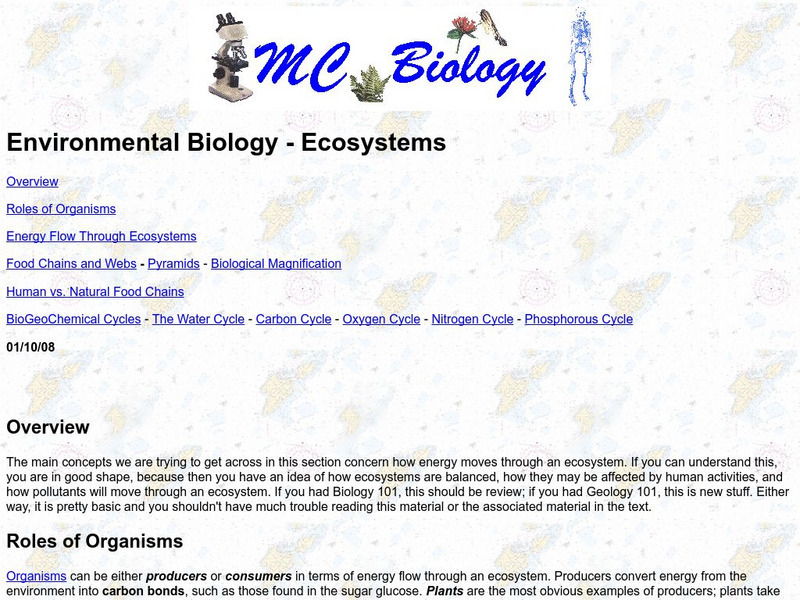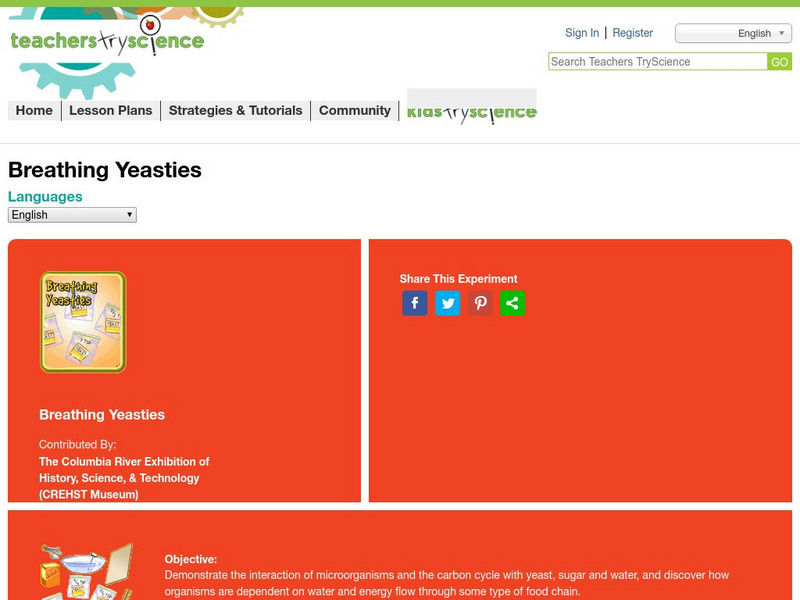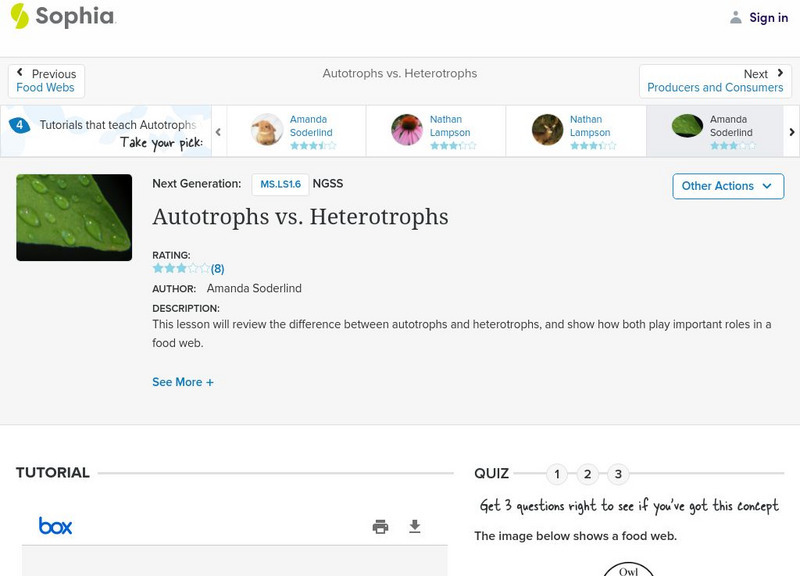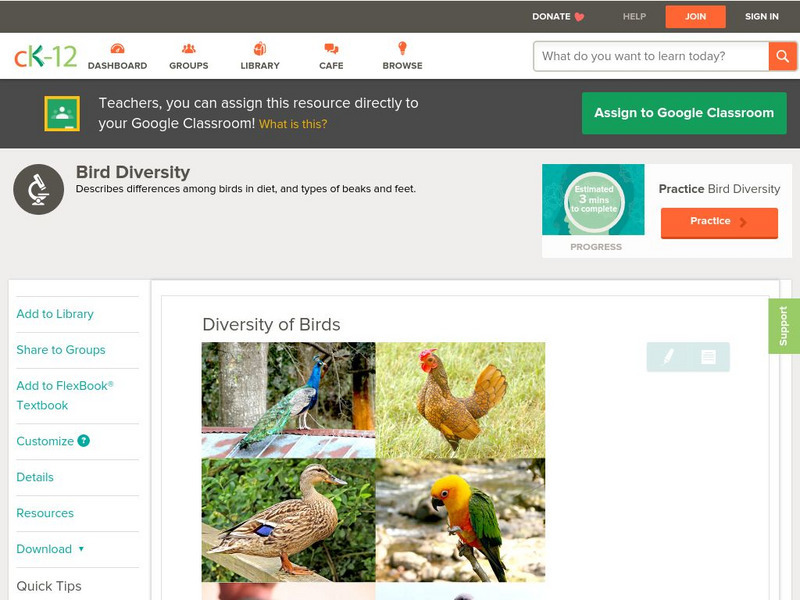Hi, what do you want to do?
Science Struck
Science Struck: Tropical Rainforest Food Web
Explains what a food web is, the complexity of one in a rainforest, and how energy flows through a food web.
Sophia Learning
Sophia: Food Webs
A short lesson explaining the "web of interactions" that occur in a food web. Understand how the energy flows between autotrophs and consumers. [0:35]
Science Struck
Science Struck: Rainforest Food Web
Explains the characteristics of tropical and temperate rainforests and what rainforest food webs look like.
Shmoop University
Shmoop: Ecosystem Energy Flow
Explains the processes by which energy flows through an ecosystem. Covers the meanings of key vocabulary, e.g., types of producers and consumers, trophic levels, food webs, and the energy pyramid.
CK-12 Foundation
Ck 12: Biology: Trophic Levels
[Free Registration/Login may be required to access all resource tools.] Describes how to identify trophic levels in a food chain or food web.
TeachEngineering
Teach Engineering: Go With the Energy Flow
Students learn about energy and nutrient flow in various biosphere climates and environments. They learn about herbivores, carnivores, omnivores, food chains and food webs, seeing the interdependence between producers, consumers and...
Other
Marietta College: Biology: Energy Flow Through the Ecosystem
Read to understand how energy and inorganic nutrients flow through a food chain in an ecosystem.
Science Struck
Science Struck: Examples of Tertiary Consumers
Explains what is meant by a tertiary consumer in a food chain and provides examples.
ArtsNow
Arts Now Learning: Ecosystems in Action [Pdf]
For this lesson, 4th graders explore animals and plants that inhabit ecosystems by using movement to deepen the retention of vocabulary. After reviewing the ecosystem players, students will play a call and response game by responding...
Teachers TryScience
Teachers Try Science: Breathing Yeasties
See how combining yeast, sugar, and water can demonstrate the carbon cycle and show how microorganisms work in the food chain.
Polk Brothers Foundation Center for Urban Education at DePaul University
De Paul University: Center for Urban Education: Changing the Ecosystem [Pdf]
"Changing the Ecosystem" is a one page, nonfiction, reading passage about the disruption in the food chain due to habitat loss and pollution and the results of that disruption. It is followed by questions which require students to...
Sophia Learning
Sophia: Autotrophs vs. Heterotrophs: Lesson 2
This lesson will review the difference between autotrophs and heterotrophs, and show how both play important roles in a food web. It is 2 of 4 in the series titled "Autotrophs vs. Heterotrophs."
PBS
Pbs: Nature: The Fascinating World of Jellies
Learn about the mysterious jellyfish blooms that have occurred in the world's oceans. Because the resulting alteration to the marine food web has had devastating effects, researchers grow and study jellyfish at the Monterey aquarium....
CK-12 Foundation
Ck 12: Life Science: Diversity of Birds
[Free Registration/Login may be required to access all resource tools.] About 10,000 bird species belong to 29 different orders within the class Aves. The diversity among birds is striking. Birds can vary greatly in size and color. Some...
BBC
Bbc Schools: Living Things: Food Chains Quiz
How are animals and plants linked? What is the difference between a producer and consumer? How is a predator different from prey? Take this food chain quiz to find out the answers to these questions and more. Links allow you to convert...
Science Bob Pflugfelder
Science bob.com: Food Web and Food Chains
The difference between food chains and food webs is explained.
US Fish and Wildlife Service
Chlorinated Hydrocarbons (Organochlorines) Ddt
Read a brief history of the use of DDT in the United States, its effect on wildlife, and the banning of the toxin in 1972 by the EPA.
Bio Topics
Bio Topics: Ecological Pyramids
A colorful tutorial about ecological pyramids. Read the information, and then check your understanding with some questions and answers about the topic.
E-learning for Kids
E Learning for Kids: Science: South Africa: How Do Organisms Get Their Energy?
Join Ellen on her trip to the Kaap De Goede Hoop in South Africa, and learn more about plants, animals, and energy.
CK-12 Foundation
Ck 12: Earth Science: Flow of Energy in Ecosystems
[Free Registration/Login may be required to access all resource tools.] Describes how energy is transferred from one organism to another.
Curated OER
National Park Service: Moon Crater Ecosystems Lesson Plan
This is a teacher's guide to a lesson on ecosystems. The objective is for the students to set up their own ecosystem and define the roles of producers, consumers and scavengers.
Georgia Department of Education
Ga Virtual Learning: Biology: Ecology I
A comprehensive ecology learning module where students assess the dependence of all organisms on one another and the flow of energy and matter within their ecosystems.
Open Curriculum
Open Curriculum: Flow of Energy in Ecosystems
Students will understand and describe food chains and food webs, and explain how energy is transferred between their trophic levels.
ClassFlow
Class Flow: What Animals Eat
[Free Registration/Login Required] To show the dependence of animals on the plant world, these flipchart pages contain examples of food chains and food webs, as well as other information about animals and habitats.






















